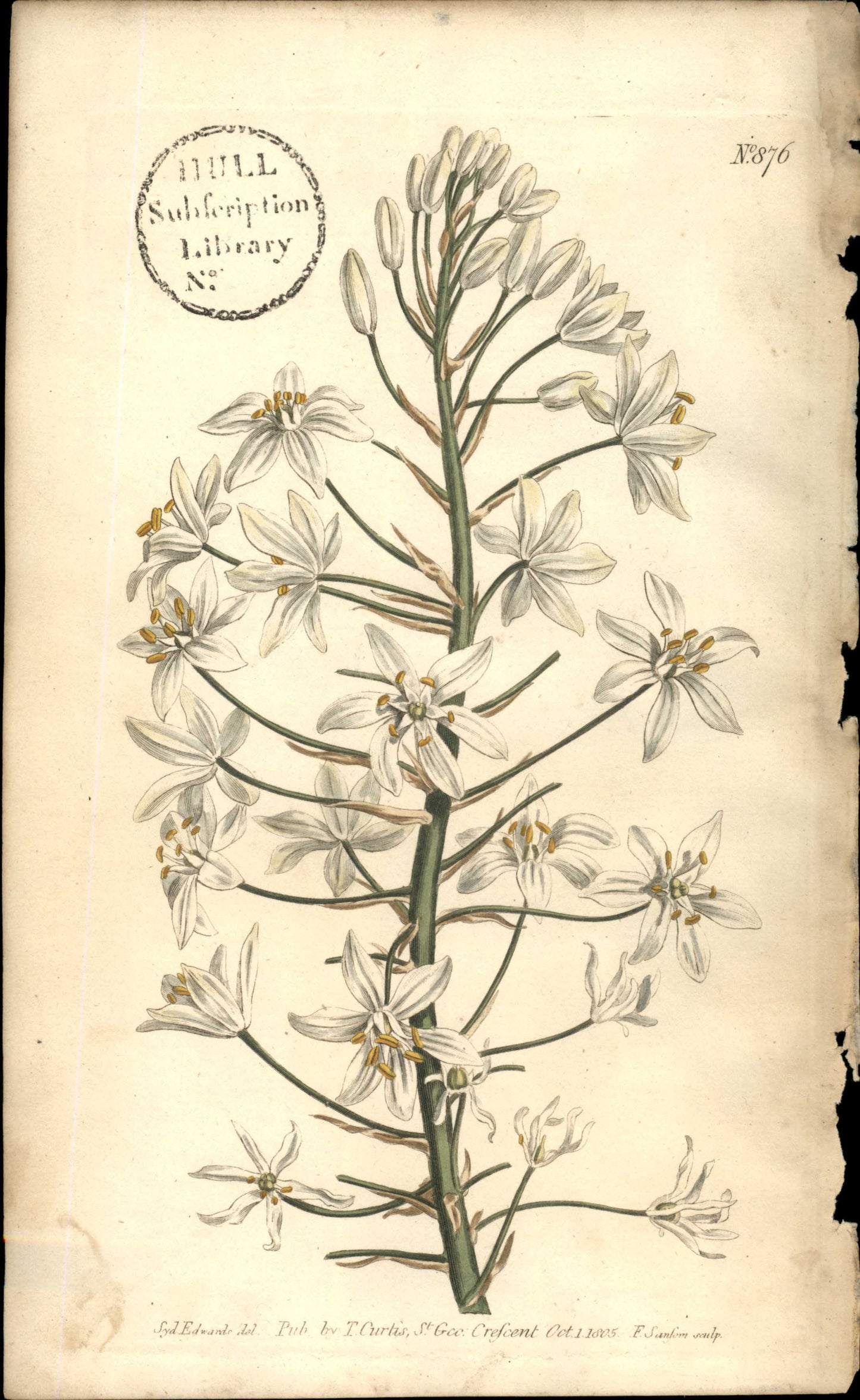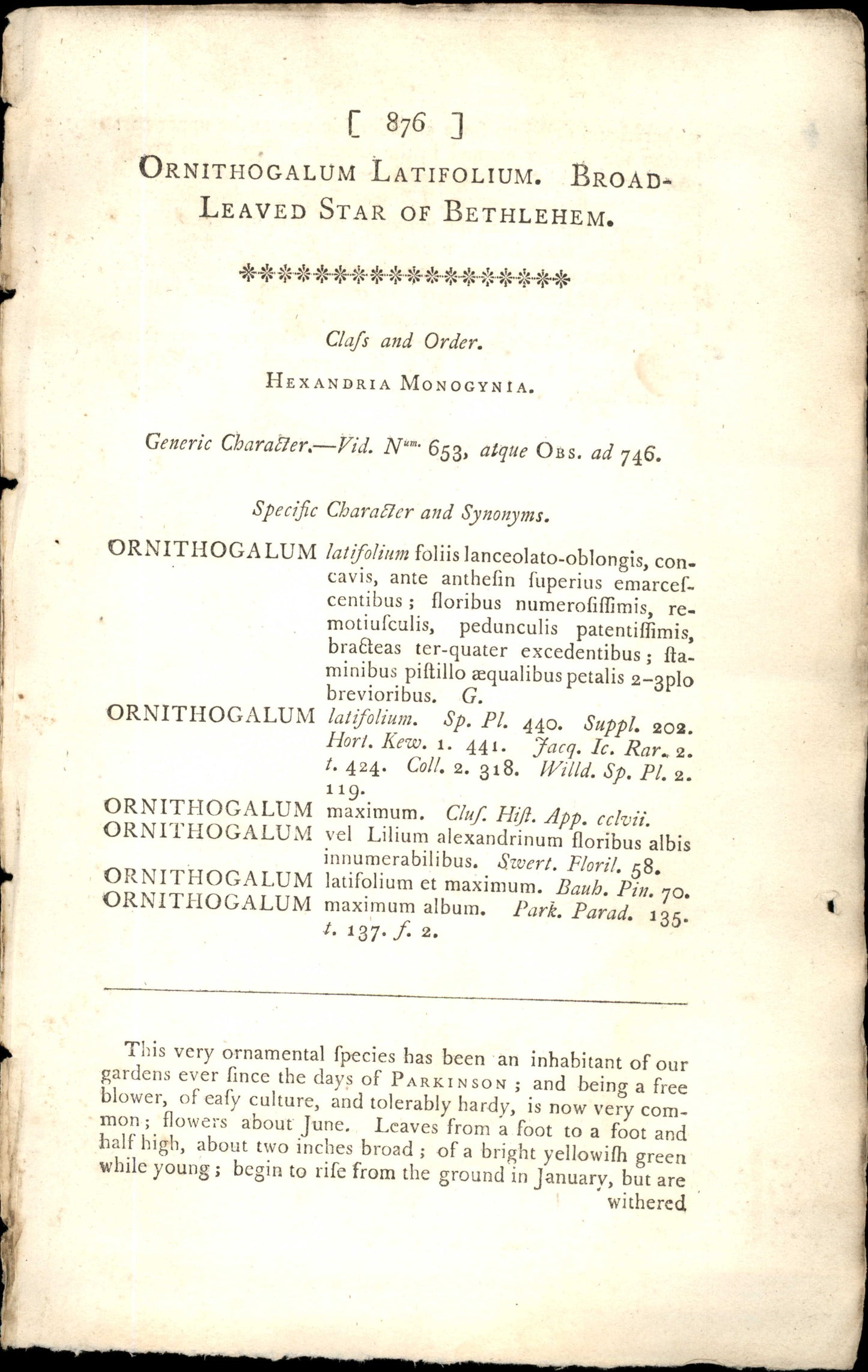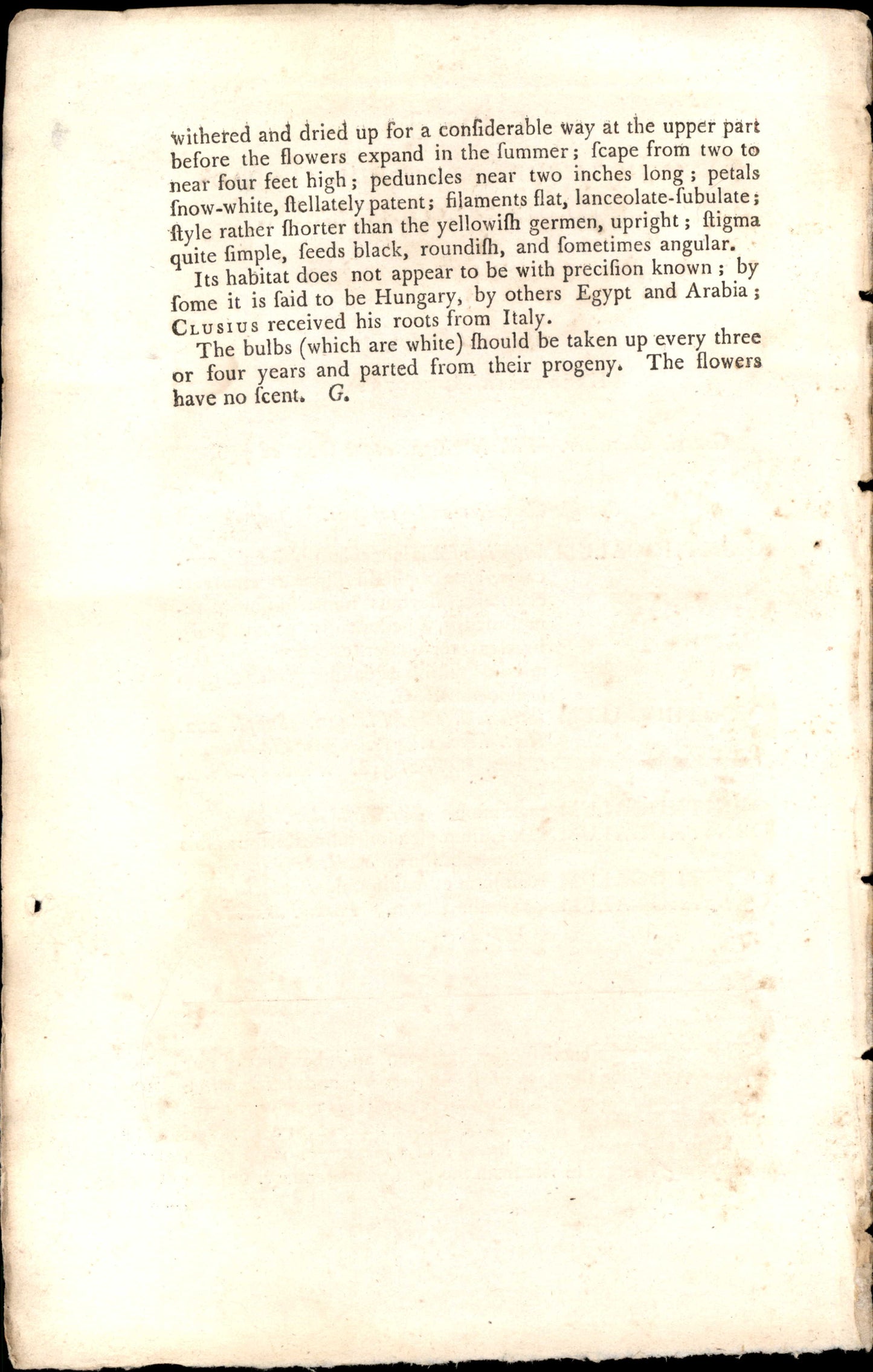Curtis Botanical Magazine
Plate 876 - Broad- Leaved Star Of Bethlehem
Plate 876 - Broad- Leaved Star Of Bethlehem
Couldn't load pickup availability
Plate 876
Classification: HEXANDRIA MONOGYNIA
Native Region: Italy
Flowering Period: June
Publication Date: sculp 1876
Description:
Complete Botanical Text (Cleaned)
[ 876 ] ORNITHOGALUM LATIFOLIUM.
BROAD- LEAVED sTAR OF BETHLEHEM. *********** Class and Order.
HEXANDRIA MONOGYNIA.
Generic Character-Vid.
Num. 653, atque OBS. ad 746. specific Character and synonyms.
ORNITHOGALUM latifolium foliis lanceolato-oblongis, con- cavis, ante anthefin fuperius emarcef- centibus; floribus numerofiffimis, re- motiufculis, pedunculis patentissimis, bractteas ter-quater excedentibus ; fta- minibus piftillo æqualibus petalis 2-3plo brevioribus.
G.
ORNITHOGALUM latifolium. sp.
Pl. 440.
Suppl. 202.
Hort.
Kew. 1. 441. t. 424.
Coll. 2. 318. 119.
Jacq.
Ic.
Rar. 2.
Willd. sp.
Pl. 2.
ORNITHOGALUM maximum.
Cluf.
Hift.
App. cclvii.
CORNITHOGALUM vel Lilium alexandrinum floribus albis innumerabilibus. swert.
Floril. 58.
ORNITHOGALUM latifolium et maximum.
Bauh.
Pin. 70.
ORNITHOGALUM maximum album.
Park.
Parad. 135. t. 137. f. 2.
This very ornamental species has been an inhabitant of our gardens ever fince the days of PARKINSON; and being a free blower, of easy culture, and tolerably hardy, is now very com- mon; flowers about June.
Leaves from a foot to a foot and half high, about two inches broad; of a bright yellowish green while young; begin to rife from the ground in January, but are withered ULL (subfcription} Library No syd Edwards dal Pub by TCurtis, sGce: Crefcent Oct.1.1805 FSantom sculp. 1876 withered and dried up for a considerable for a considerable way at the upper part before the flowers expand in the summer; fcape from two to near four feet high; peduncles near two inches long; petals fnow-white, ftellately patent; filaments flat, lanceolate-fubulate; ftyle rather shorter than the yellowish germen, upright; stigma quite simple, seeds black, roundifh, and sometimes angular.
Its habitat does not appear to be with precifion known; by some it is faid to be Hungary, by others Egypt and Arabia; CLUSIUS received his roots from Italy.
The bulbs (which are white) fhould be taken up every three or four years and parted from their progeny.
The flowers have no fcent.
G
Raw OCR Text (Original)
[ 876 ] ORNITHOGALUM LATIFOLIUM. BROAD- LEAVED sTAR OF BETHLEHEM. *********** Class and Order. HEXANDRIA MONOGYNIA. Generic Character-Vid. Num. 653, atque OBS. ad 746. specific Character and synonyms. ORNITHOGALUM latifolium foliis lanceolato-oblongis, con- cavis, ante anthefin fuperius emarcef- centibus; floribus numerofiffimis, re- motiufculis, pedunculis patentissimis, bractteas ter-quater excedentibus ; fta- minibus piftillo æqualibus petalis 2-3plo brevioribus. G. ORNITHOGALUM latifolium. sp. Pl. 440. Suppl. 202. Hort. Kew. 1. 441. t. 424. Coll. 2. 318. 119. Jacq. Ic. Rar. 2. Willd. sp. Pl. 2. ORNITHOGALUM maximum. Cluf. Hift. App. cclvii. CORNITHOGALUM vel Lilium alexandrinum floribus albis innumerabilibus. swert. Floril. 58. ORNITHOGALUM latifolium et maximum. Bauh. Pin. 70. ORNITHOGALUM maximum album. Park. Parad. 135. t. 137. f. 2. This very ornamental species has been an inhabitant of our gardens ever fince the days of PARKINSON; and being a free blower, of easy culture, and tolerably hardy, is now very com- mon; flowers about June. Leaves from a foot to a foot and half high, about two inches broad; of a bright yellowish green while young; begin to rife from the ground in January, but are withered ULL (subfcription} Library No syd Edwards dal Pub by TCurtis, sGce: Crefcent Oct.1.1805 FSantom sculp. 1876 withered and dried up for a considerable for a considerable way at the upper part before the flowers expand in the summer; fcape from two to near four feet high; peduncles near two inches long; petals fnow-white, ftellately patent; filaments flat, lanceolate-fubulate; ftyle rather shorter than the yellowish germen, upright; stigma quite simple, seeds black, roundifh, and sometimes angular. Its habitat does not appear to be with precifion known; by some it is faid to be Hungary, by others Egypt and Arabia; CLUSIUS received his roots from Italy. The bulbs (which are white) fhould be taken up every three or four years and parted from their progeny. The flowers have no fcent. G.
Original botanical print from Curtis's Botanical Magazine
Share







